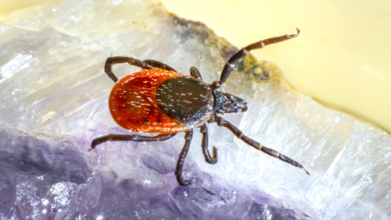- Health Conditions A-Z
- Health & Wellness
- Nutrition
- Fitness
- Health News
- Ayurveda
- Videos
- Medicine A-Z
- Parenting
- Web Stories
14-Year-Old Boy Dies Days After Complaining Of 'Headache And Fever' From Rare Bacterial Infection

Credits: Facebook
The unexpected and tragic death of Greenville, South Carolina 14-year-old William "Will" Hand stunned the local population and has caused worldwide concern about a rare but virulent bacterial infection: meningococcal septicemia or meningococcemia. Will, a graduating eighth-grader at Hughes Academy of Science and Technology, died in a matter of days of showing symptoms, which emphasizes the importance of early diagnosis, vaccination, and public awareness.
William Hand was not just an excellent student but also a well-loved friend, athlete, jokester, and music lover. Friends and family have referred to him as the "life of the party," defining his personality by humor, sportiness, and a talent for transforming everyday situations into memories that never faded. He had just finished eighth grade and was anticipating a summer of baseball, good times, and friends. Sadly, his life was ended on June 8th, just a few days after he developed what appeared to be flu-like symptoms.
Will's mother, Megan Hand, reported that her son passed away due to meningococcal septicemia—a rare and usually deadly bloodstream infection caused by the bacterium Neisseria meningitidis. Within hours of developing symptoms of illness, such as a high fever and rash, Will's situation rapidly worsened in spite of aggressive treatment from the staff at Prisma Health Children's Hospital.
What is Meningococcemia?
Meningococcemia is when Neisseria meningitidis enters the blood and starts to proliferate indiscriminately. As Dr. Anna-Kathryn Burch, a pediatric infectious disease expert for Prisma Health, explained, "The infection occurs so rapidly, and when it begins going, sometimes it is really difficult to save the individual who is infected with the bacteria."
The illness is spread by respiratory secretions and saliva—most often through close contact or sharing utensils and drinks. Symptoms typically start suddenly and can include high fever, severe headache, light sensitivity, nausea, vomiting, and petechial rash. This red rash, which looks like broken capillaries beneath the skin, does not fade when pressed and is an important indicator of bloodstream infection.
Dr. Burch made it clear that though meningococcal disease is unusual, it is very aggressive and needs prompt medical care. "It's not your average viral rash. If you push your finger on it and the spots don't dissipate, it's a medical emergency."
The South Carolina Department of Health and Environmental Control (DHEC) has documented 12 cases of Neisseria meningitidis in the past 18 months—eight in the Upstate area, four deaths. Although the public has become concerned, DHEC insists that this is not an outbreak. "We track all cases and have determined there is no epidemiological connection among cases," a spokesperson explained.
Nonetheless, the public is understandably upset. Will's tale has resonated with many, increasing discussion regarding bacterial meningitis, its signs, and the necessity of prevention.
Symptoms of Meningococcemia
Meningococcemia is an uncommon but aggressively progressing infection by bacteria that invades the blood, usually causing severe and even fatal complications if left untreated. The following is a description of its signs of onset, underlying causes, and ensuing severe complications.
Meningococcemia comes on rapidly—typically within hours—and usually is described by patients as the worst they've ever experienced. Initial symptoms may resemble flu or an overall viral illness but worsen rapidly. Watch out for:
- Cold hands and feet
- Severe leg pain in the muscles
- Extreme lethargy or fatigue
- Rapid or shallow breathing
- Severe abdominal pain
- Shivering or chills, also called "rigors"
- Skin color changes, such as paleness or skin patches that are discolored
- Characteristic rash
Begins as tiny, flat red spots (petechiae) in areas where pressure tends to cause them, such as the armpits, waistband, ankles, elbows, or inner thighs. It can progress to larger purplish patches (purpura) as the illness becomes more severe.
What Causes Meningococcemia?
The disease is due to Neisseria meningitidis bacteria (also referred to as meningococcus). It usually enters the body when inhaled and spreads either of two ways:
To the blood → giving rise to meningococcemia.
To the brain and spinal cord → resulting in meningitis.
During meningococcemia, the bacteria lyse blood vessels, disrupting oxygen supply to tissues—a characteristic of its life-threatening potential.
Importance and Role of Vaccation
The Centers for Disease Control and Prevention (CDC) suggests routine immunization of adolescents against meningococcal disease. Two FDA-licensed vaccines exist, the Meningococcal ACWY vaccine, generally given at age 11 with a booster shot in 16, and the Meningococcal B vaccine, which can be suggested depending on personal risk factors.
"These vaccines represent our best defense against this fatal infection," added Dr. Burch. "They don't protect against every strain, but they greatly lower the risk of severe illness and death." Parents can speak to their healthcare providers about vaccinating their children, particularly as they begin middle school and high school.
Will's obituary is a testament to a bright, bubbly teenager who brightened up every space. "His passing leaves an emptiness that can never be filled, but his joyous personality, winning smile, and charismatic presence will live in the hearts of all who knew him," the family wrote. "This infection is uncommon," Dr. Burch said, "but when it occurs, every second counts.
The Endometriosis Battle Finally Comes To An End For Bindi Irwin, As She Undergoes Removal Of 51 Lesions, Cyst, And Appendix

Credits: Instagram and Canva
A Lifelong Battle With Endometriosis: In a heartfelt post, shared on Instagram, Bindi Irwin, daughter of 'Crocodile Hunter', Steve Irwin shared a health update where she wrote about her journey of battling with endometriosis. She wrote that after 13 years of "fighting for answers", she is finally healing.
Her post revealed that she had to undergo a total of removal of 41 endometriosis lesions, a chocolate cyst, her appendix, and repair of a hernia from childbirth.
She wrote: "51 endometriosis lesions, a cyst, and my appendix were all removed across two surgeries with @seckinmd. My hernia from giving birth that was unzipping – was taken care of. I can FINALLY say that I’m feeling better. Genuinely healing.”
ALSO READ: Why Do We Know So Little About Women's Health?
Battling Endometriosis
A conservationist herself, inspired by her father, shared that she felt ashamed as a teenager and young adult when she had to speak about the painful endometriosis symptoms she suffered. Her message was: No young woman should feel ashamed or alone with pain that is too often dismissed as "just part of being a woman".
She revealed her diagnosis in March 2023 on social media. Since then, she has highlighted about this condition, which affects millions worldwide. In her recovery and healing journey Dr Tamer Seckin, an endometriosis specialist played a prominent role, who removed the 51 lesions during two separate surgeries, reported Fox News.
What Is Endometriosis?
As per the World Health Organization (WHO), endometriosis affects roughly 10%, which estimates to 190 million of reproductive age women and girls globally. In US alone, it impacts around 9 million women.
The Journal of the American Medical Association notes that diagnosis is often delayed and it averages from 5 to 12 years after the onset of symptoms due to the stigma and misdiagnosis. Often dismissing the pain as part of being a girl.
WHO notes that endometriosis is a disease in which tissue similar to the lining of the uterus grows outside the uterus. It can cause severe pain in the pelvis and make it harder to get pregnant. The symptoms can start at menarche and last until menopause.
The cause of endometriosis is unknown, and the WHO also notes that there is no way to prevent it or no cure available. However, the symptoms can be treated with medicines, and in severe cases, surgery may be required.
In case of a chocolate cyst, which was the case with Bindi Irwin, the ovarian cyst is filled with a thick, dark, tar-like fluid, which resembles melted chocolate. This fluid is old blood and endometrial tissue, which has accumulated due to endometriosis.
What Are The Common Symptoms Of Endometriosis?
The common symptoms include:
- Severe pain in the pelvis, especially during menstruation
- Pain during sex
- Pain while using the bathroom
- Infertility issues
However, some people with endometriosis may not have any symptoms, however, they feel pain in the lower part of the belly, this is where pain is most noticeable.
Other symptoms include:
- Chronic pelvic pain
- Heavy bleeding during periods or between periods
- Trouble getting pregnant
- Nausea or bloating
- Fatigue
- Depression and anxiety
Iowa-based Pharmacy Faces Charges For Selling Counterfeit Ozempic

Credits: Canva
Ozempic Lawsuit: For any medication that gains a popular status, there is a counterfeit available in the market. Similar happened with Ozempic, a popular diabetes and weight-loss drug, as a result, an Iowa pharmacy company, which is already involved in multi-million dollar lawsuit is now facing additional sanctions for distributing counterfeit Ozempic.
The Iowa Board of Pharmacy announced disciplinary actions against SmartScripts.
Did The Pharmacy Intentionally Sell Counterfeit Ozempic?
As per the reports, the timeline could be dated back to November 2023, when SmartScirpts placed an order with wholesale supplier Pharma Pac for a single case of Ozempic, which would contain 1,260 Ozempic pens. Each pen was designed to administer 4 milligrams of medications.
The problem arose when SmartScripts received 15 cases of medications, instead of a single one, ordered initially. Todd Thompson, who is the company owner went to ship the excess inventory to Central Pharma Management in Lansing, Michigan, which distributed the product among different pharmacies.
While all this seems too simple, the problem arose when Pharma Pac contacted Thompson for payment of the 15 cases.
Thompson's response to this was: quarantining the remaining Ozempic and advising the recipient pharmacies to halt the sales of the products.
Though there was no such reason mentioned in the regulatory documents for any such precautionary measures. So, why did Thompson asked the companies to put the sales on hold? The question arises: did he know that the Ozempic was a counterfeit product?
ALSO READ: This Naturally Occurring Molecule May Have Ozempic-like Benefits Without The Side Effects
Reporting Counterfeit Products
As per reports and state regulators, Thompson became aware about the counterfeit Ozempic on December 21, 2023, however, he did not notify the Iowa Board of Pharmacy until July 2024. This delayed reporting played a prominent role when disciplinary charges were filed against SmartScripts in January 2025.
Thompson, however, claims that he learned about the counterfeit drugs only after he had received a notification from the Food and Drug Administration (FDA) after he sold the products to Central Pharmacy Management. According to him, immediate action was taken to contact the purchasing pharmacy. He says that instead of being a participant in fraudulent activities, his company is among those over 100 pharmacies nationwide that fell victim to similar drug counterfeit schemes.
What Happens When You Consume Counterfeit Ozempic?
FDA on April 14, 2025, released an advisory against counterfeit Ozempic. The advisory reads:
"FDA was notified by Novo Nordisk on April 3, 2025, that several hundred units of counterfeit Ozempic (semaglutide) injection 1mg were in the U.S. drug supply chain. The counterfeit products were distributed outside the Novo Nordisk authorized supply chain in the U.S. FDA seized the identified counterfeit products on April 9, 2025.
The agency advises patients, wholesalers, retail pharmacies and health care professionals to check the Ozempic products they have received and not use, distribute or sell products labeled with lot number PAR0362 and serial number starting with the first eight digits 51746517."
Invasive New Tick Species Could Spread Little-Known Infectious Disease, Scientists Warn

Credits: Canva
A highly invasive tick species is spreading across the United States, carrying with it a previously unknown but potentially crippling infection that is causing scientists concern. First identified in New Jersey in 2017, the Asian longhorned tick has been detected in at least 21 states. With rising temperatures extending tick season and broadening their habitat, scientists fear that these invasive parasites may catalyze the spread of ehrlichiosis, a bacterial infection that is already increasing in the U.S.
Americans have linked ticks for decades with Lyme disease. But as climate change continues to reshape ecosystems and new invasive populations find a toehold, the risk landscape is evolving. Ehrlichiosis, previously rare, is now emerging as a major public health problem—and the experts say the risks are likely to increase.
Indigenous to East Asia, the Asian longhorned tick is an opportunistic species. It came to other nations such as Australia, New Zealand, and various Pacific islands before it arrived unobtrusively in the United States. Scientists speculate that it most likely rode in on imported animals or livestock, but their point of entry is not known.
Since its New Jersey discovery, the tick has consistently gained a foothold throughout the Northeast, Midwest, and South. Michigan had its first sighting during this summer, indicating how rapidly its range is spreading. Modeling research indicates that the majority of North America—southern Canada to almost every nook and cranny of the continental U.S.—poses acceptable habitat for this resilient species.
What's more frightening about the longhorned tick is that it can reproduce without mating. One female will produce thousands of offspring, which enables populations to increase quickly. Unlike most indigenous animals, this tick is also able to co-feed on the same host with other ticks and retrieve and pass along pathogens very efficiently.
What is Ehrlichiosis?
The tick-transmitted disease ehrlichiosis, caused by the bacterium Ehrlichia chaffeensis, has risen in the shadows of recent years. A bite produces its effects usually one to two weeks later, in the form of fever, chills, muscle pain, headaches, and crushing fatigue.
Though most of them recover with early treatment, the disease becomes life-threatening if neglected. In serious situations, it develops into respiratory failure, brain and nervous system injury, uncontrollable bleeding, or organ failure. Approximately 60% of patients need to be hospitalized, and about 1% die from the disease, as per the CDC.
Confirmed cases went from only 200 in 2000 to over 2,000 in 2019. Experts, however, believe these figures are merely the tip of the iceberg. Rutgers University studies indicate that as much as 99% of infection may go undetected or unreported, masked by nonspecific flu-like symptoms doctors may attribute to other explanations.
Is Climate Change Contributing To Tick-Borne Diseases?
The biology of ticks is closely coupled with the weather. In the past, long, frigid winters kept tick populations low, both in terms of their numbers and in terms of the diseases they were spreading. Climate change is rewriting that season script, though.
"We are losing winter," says Connecticut's tick-testing program director, Goudarz Molaei. "And this tick, like others, will be active year-round."
Warmer, shorter winters mean ticks come out of hibernation earlier and remain active for longer periods, raising the chances of human contact. The CDC just released word of an all-time high number of emergency room visits in July for tick bites—illustrating how rapidly the risks are increasing.
The longhorned tick is not coming alone. A study in iScience reported seven non-native tick species arriving in Connecticut during 2019-2023. They rode in on livestock, pets, or travelers and are potential carriers of domestic and exotic diseases.
Several of these ticks carried bacteria similar to those causing Rocky Mountain spotted fever, a lethal disease recently starting to appear in Connecticut even though it has been nonexistent there historically. Other invasive ticks are recognized carriers of Theileria orientalis, a cattle-decimating parasite not yet shown to pose danger to humans.
Worldwide, ticks spread over 17% of infectious diseases in humans, the World Health Organization finds. In the United States, they are responsible for 77% of all vector-borne illnesses, case loads more than doubling over the past 15 years. The introduction of invasive ticks merely increases the stakes.
Why Invasive Ticks Are Different?
In contrast to indigenous species, invasive ticks present two such significant threats: they increase the range of current diseases and bring with them the potential to introduce entirely new ones. With their explosive ability to breed and thrive in a variety of climates, longhorned ticks are particularly well-suited to redefine the U.S. disease map.
Their diet also distinguishes them. Though they usually prefer livestock, they will consume humans if given the chance. And when there is more than one tick species that feeds on a single animal, they can share pathogens with each other in what is called "co-feeding transmission," multiplying the chances of new disease dynamics.
How Ticks Spread Diseases?
Ticks are not born with pathogens. They pick them up after they feed on an infected animal like deer, rodents, or livestock. Ticks being infected have the ability to transmit the pathogen to the next host—occasionally human.
America has about 50 native tick species that will bite humans and transmit diseases such as Lyme disease, babesiosis, anaplasmosis, and Rocky Mountain spotted fever. Invasive ticks, however, expand that menu of potential harm by introducing pathogens from elsewhere in the world into American habitats.
Is There Any Way to Avoid Tick-Borne Disease?
As scientists track the spread of invasive ticks, members of the public can act to minimize individual risk. Long sleeves and long pants in tick-infested areas, repellents that have DEET or permethrin, and careful tick checks after going outside are the most effective measures.
Medical professionals also advise travelers to report recent travel when they go for medical attention for tick bites, as invasive ticks from other countries are often hard to distinguish from local ones. Prompt diagnosis and treatment of ehrlichiosis and other diseases can be the difference between life and death.
The outbreak of invasive ticks in the United States illustrates how global change, fueled by climate change, trade, and travel, reconfigures local health threats. Within a decade, a species foreign to most Americans is now a possible cause of a major public health epidemic. Experts predict it's only a matter of time before other invasive ticks catch local or native pathogens, or even create new ones not previously observed in the US.
© 2024 Bennett, Coleman & Company Limited

